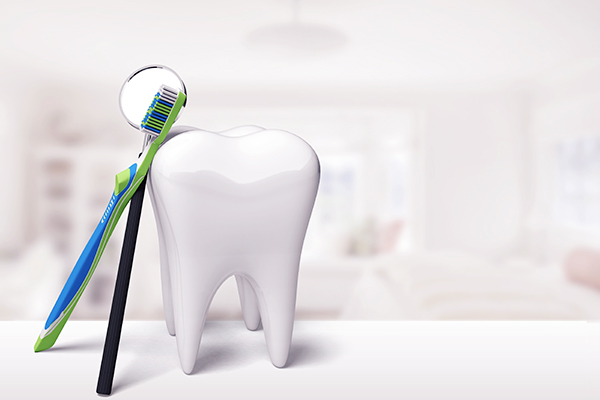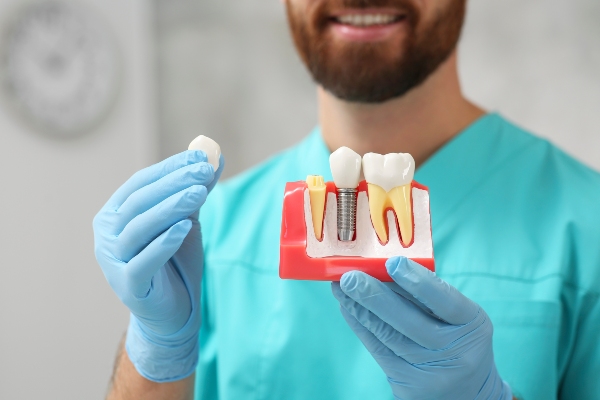Maintaining Dental Check-Up Appointments After Periodontal Disease Treatment

Following the treatment of periodontal disease, it is vital that a patient keeps the dental checkup appointments that the dentist recommends. Periodontal maintenance, which typically requires dental check-ups every three months post-treatment, is essential for continuing results. Without routine maintenance, the patient risks a relapse in oral health.
Understanding periodontal disease
Periodontal disease is a chronic oral health condition that affects the tissues that surround and support the teeth. Untreated gum disease is a major cause of tooth loss in adults today. In the beginning stages, gum disease is painless and virtually unnoticeable, which is why many patients are unaware of its existence. Gum disease is caused by excessive plaque buildup and is characterized by a number of symptoms:
- Swollen or bleeding gums
- Receding gums
- Tender gums
- Pus at the location where the teeth and gums touch
- Persistent bad breath and a bad taste in the mouth
- Changes in the way the teeth come together during a bite
Preventing gum disease is simple since it merely requires regular brushing, flossing and a commitment to making each dental check-up appointment. However, when signs of the condition are present, early treatment is necessary to reverse it and prevent further damage.
Understanding the necessity of dental check-up appointments
Because periodontal disease is a chronic condition with no known cure, ongoing maintenance is necessary to preserve the health and integrity of the teeth. Without careful monitoring and the comprehensive care of a skilled dentist, a patient risks experiencing recurring gum disease in the future.
Once a dentist and patient have successfully combatted periodontal disease, the dentist will recommend periodontal maintenance procedures. These practices will enable the patient to gain control of the disease and increase the likelihood of long-term oral health.
Periodontal maintenance involves intensive treatments
Periodontal maintenance differs from the standard dental check-ups in two distinct ways. First, routine dental check-ups focus mainly on cleaning the teeth of healthy patients and removing calculus, plaque and stains from the tooth structure. Periodontal maintenance, on the other hand, is much more intensive and focuses on healing the gaps in the teeth, averting pain, preventing infection and restoring damaged areas.
Initial maintenance visits will consist of special cleaning treatments called root planing or scaling. These cleanings help to remove tartar and plaque buildup so that the gums can heal properly. Some patients may require surgical intervention. Once the gaps caused by the disease have shrunk, the dentist will focus on clearing the periodontal pockets of tartar and plaque buildup. To help prevent pain and further infection, a dentist may prescribe medication.
Periodontal maintenance requires recurrent dental visits
The second difference between routine and periodontal check-ups involves the frequency of visits. Routine dental check-ups usually occur every six months. Depending on the extent of the infection, however, a dentist may recommend periodontal maintenance every few weeks to every three months for gum disease patients. At each dental check-up, the dentist will monitor the patient’s mouth for disease progression and the effectiveness of the treatment. The dentist may increase or decrease the frequency of visits based on the health of the mouth.
Conclusion
Periodontal disease is a chronic and damaging condition that requires ongoing maintenance. If you notice signs of gum disease, schedule a dental check-up today.
Request an appointment here: https://www.chanfamilydentistry.com or call Chan Family Dentistry at (510) 214-8450 for an appointment in our San Lorenzo office.
Check out what others are saying about our dental services on Yelp: Dental Checkup in San Lorenzo, CA.
Recent Posts
Preventative dental care is an effective way to help reduce the risk of oral health conditions. Preventive dental care includes regular checkups, brushing teeth twice a day, and flossing at least once daily. These tasks can be time-consuming and seem trivial, but they are crucial for maintaining good oral hygiene. The American Dental Association recommends…
Many people do not know that regular dental checkups are the most important preventive dentistry procedures against oral cancer. The dentist’s objective is to prevent and diagnose any issue as early as possible, when treatment is easier. Preventive dentistry is all about keeping the oral cavity healthy for a long time. Oral cancer screening is…
Preventive dentistry involves using the right products. This includes selecting the right toothpaste. There is a type of toothpaste for every person. If you want to enhance your preventive dentistry brushing strategy, here are some tips on choosing the right toothpaste.The attending dentist will be the judge of the most suitable toothpaste. The dentist knows…
Preventive dentistry can protect your teeth and gums. Its main goal is to keep dental problems away. It also aims to detect any oral issue early to prevent it from worsening. Preventive dentistry clinics have different ways to help keep your dental health in top condition. If you want to know how preventive dentistry can…


